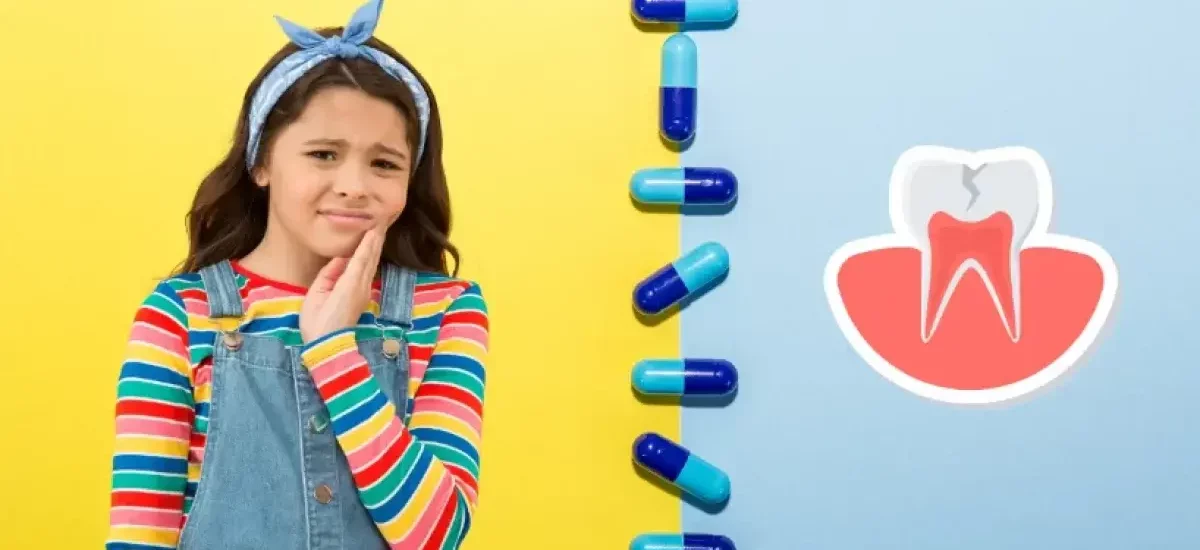

wordpress-seo domain was triggered too early. This is usually an indicator for some code in the plugin or theme running too early. Translations should be loaded at the init action or later. Please see Debugging in WordPress for more information. (This message was added in version 6.7.0.) in /home/sehatnagar.com/public_html/wp-includes/functions.php on line 6114
What Is the Strongest Natural Antibiotic for Tooth Infection? Learn about Strongest Natural Antibiotic for Tooth Infection and explore how they can be helpful in treating tooth infection.
Tooth infections are a common problem that can cause a lot of pain and trouble. When bacteria get inside a tooth, it can lead to inflammation and infection. This happens because of things like cavities, dental injuries, or not taking good care of our teeth. Tooth infections have symptoms like a persistent toothache, sensitivity to hot or cold foods, swelling of the face or gums, bad breath, and a yucky discharge. If we ignore these signs, it can get worse and even spread the infection to other parts of our body. That’s why it’s really important to find effective ways to treat tooth infections. While dentists often use traditional antibiotics, there is now a growing interest in natural antibiotics and how they can help our teeth and overall oral health.
Natural antibiotics are remedies prepare from plants, herbs, or even certain foods. They contain special properties that can fight bacteria, fungus, and reduce inflammation. People like them because they usually have fewer side effects compared to regular antibiotics and may work well when used together with traditional treatments. One of the big advantages of natural antibiotics is that they may not cause bacteria to become resistant, which is a big problem with regular antibiotics. Some natural antibiotics can also help with healing, reduce swelling, and keep our mouths healthy.
Tooth infections, also known as dental abscesses, happen when harmful bacteria get inside a tooth and cause an infection. The bacteria can enter through deep cavities, cracks in the teeth, or dental injuries. They like to grow in our mouths, especially when we don’t take good care of our teeth. If a tooth infection is not treated, it can lead to various complications. The infection can spread from the tooth to the gums, jawbone, and even to the face or neck. This can cause a lot of pain and swelling. In some cases, the infection can even enter the bloodstream and become a serious, life-threatening condition called sepsis.
Not only can tooth infections cause physical problems, but they can also affect our overall health. Studies have found links between oral health and conditions like heart disease, diabetes, and respiratory infections. So, it’s important not to ignore a tooth infection. That’s why it is important to seek help from a dentist if we think we have a tooth infection. Dentists know how to diagnose and treat these infections properly. They will examine the infected tooth, maybe take X-rays to see how bad it is, and decide on the best treatment.
Dental care for tooth infections usually involves draining any pus, getting rid of the infected parts of the tooth (which might involve a root canal), and giving antibiotics to kill the bacteria. Dentists may also help with managing the pain and give us advice on how to take care of our teeth to prevent more infections.
When it comes to treating tooth infections, dentists often use traditional antibiotics to fight the bacterial infection and help with healing. These antibiotics are prescribed based on how severe the infection is and the person’s medical history. Let’s take a closer look at the common antibiotics used for tooth infections, how well they work, any possible side effects, and why it’s important to take them correctly.
Dentists often prescribe penicillin or a similar antibiotic called amoxicillin for tooth infections. These antibiotics stop the bacteria from growing and making more bacteria. They can work against many different types of bacteria that commonly cause dental infections. But it’s important to know that some bacteria have become resistant to penicillin, so it might not always work.
Another antibiotic called clindamycin is used to treat tooth infections, especially when the infection doesn’t respond to penicillin. Clindamycin works by interfering with the bacteria’s ability to make proteins, which kills them. It can fight a broader range of bacteria and is often given to people who are allergic to penicillin.
While antibiotics can be very helpful for tooth infections, they can also have side effects. Some people may experience upset stomach, nausea, diarrhea, or stomach pain. In rare cases, people may have an allergic reaction, like a rash, swelling, or trouble breathing. It’s important to tell the dentist about any known allergies or bad reactions to antibiotics before starting treatment.
To make sure antibiotics work well and to prevent bacteria from becoming resistant to them, it’s important to take them exactly as prescribed and finish the full course of treatment. Even if the symptoms start to get better, stopping the antibiotics too soon can leave some bacteria alive, which may cause the infection to come back or not go away completely. It’s also important to take antibiotics at the right times and in the right amounts, as instructed by the dentist. This helps keep a steady level of the drug in the body and makes it more effective against the bacteria causing the infection.
The specific antibiotic and how long to take it may vary depending on how bad the infection is, the type of bacteria involved, and other individual factors. Dentists make these decisions based on their professional judgment and experience. So, it’s important to listen to the dentist’s advice and complete the prescribed antibiotic treatment. This will help effectively fight the tooth infection and reduce the risk of complications.
Natural antibiotics have become increasingly popular as a potential solution for treating tooth infections. These antibiotics are derived from natural sources like plants and herbs, and many people are turning to them as an alternative to traditional antibiotics. Let’s take a closer look at what natural antibiotics are, their benefits, and why it’s important to have scientific evidence to support their effectiveness.
More and more people are becoming interested in natural antibiotics for tooth infections. They are seen as a holistic and gentle approach to dental care, especially when compared to conventional antibiotics. People are seeking natural alternatives because they are concerned about the side effects and overuse of traditional antibiotics.
One of the main advantages of natural antibiotics is that they tend to have fewer side effects than traditional antibiotics. They are often considered gentler on the body and are less likely to cause issues like stomach upset or allergic reactions. This makes them appealing to individuals who may have sensitivities or allergies to regular antibiotics.

Additionally, natural antibiotics can offer other health benefits beyond just fighting bacteria. Some plant-based compounds have anti-inflammatory properties and can help reduce pain and inflammation. They may also boost the immune system, which can aid in the overall healing process.
While natural antibiotics are gaining popularity, it’s crucial to have scientific evidence to support their effectiveness in treating tooth infections. Anecdotal evidence and historical use can provide some insights, but rigorous scientific studies are necessary to validate their efficacy and ensure their safety.
Scientific research on natural antibiotics involves studying the active compounds, understanding how they work, and conducting clinical trials to test their effectiveness. This evidence-based approach helps determine the right dosages, identify any potential interactions with other medications, and establish consistent results across different individuals.
When it comes to natural options for treating tooth infections, there are several strongest natural antibiotic that have shown potential in preventing Tooth Infection. Let’s explore a range of these strong natural antibiotics and how they can benefit tooth infections.
Garlic is not only a tasty ingredient in food but also has antimicrobial properties. It contains a compound called allicin, which can fight against bacteria. Garlic has been found to be effective against bacteria that cause tooth infections, such as Streptococcus mutans and Porphyromonas gingivalis. It may also help reduce inflammation and discomfort associated with tooth infections.
Tea tree oil is a natural antibacterial agent derived from the leaves of the Melaleuca alternifolia tree. It contains a compound called terpinen-4-ol, which has strong antimicrobial effects. Research suggests that tea tree oil can inhibit the growth of bacteria responsible for tooth infections. It is commonly used as a mouthwash or added to toothpaste for its antibacterial benefits. However, it’s important to use diluted tea tree oil and follow proper guidelines to avoid irritation.
Clove oil has been traditionally used for toothaches due to its powerful antimicrobial properties. It contains a compound called eugenol, which has both antibacterial and pain-relieving effects. Clove oil has been found to be effective against oral pathogens like Streptococcus mutans and Enterococcus faecalis, which contribute to tooth infections. Applying a small amount of clove oil directly to the affected area can temporarily relieve pain and reduce bacterial growth.
Turmeric, a yellow spice commonly used in cooking, has antibacterial and anti-inflammatory properties. Its active compound, curcumin, has been studied for its health benefits. Curcumin can fight against oral pathogens, including Streptococcus mutans and Actinomyces viscosus, which can cause tooth infections. Additionally, turmeric’s anti-inflammatory properties can help reduce swelling in the mouth. It can be used as a mouth rinse or applied topically to the affected area to potentially fight bacteria and reduce inflammation.
Manuka honey is a special type of honey derived from the nectar of the Manuka tree in New Zealand. It is known for its unique antibacterial properties due to the presence of methylglyoxal (MGO). Manuka honey has been found to have strong antibacterial activity against various bacteria, including those responsible for tooth infections. Its composition creates an environment that inhibits bacterial growth and promotes healing. Applying Manuka honey topically or using it as a mouthwash may help reduce bacterial growth and support healing.
While these strongest natural antibiotic have shown promise for tooth infection, it’s important to note that scientific research on their effectiveness is still ongoing. It is recommended to consult with dentist before using natural antibiotics and to follow their guidance. Natural antibiotics can be used alongside professional dental care to support oral health and aid in the healing process for tooth infections.
Read Also: How Long Should You Wait To Exercise After Tooth Extraction?
Professional dental care is important and should not be replaced by natural antibiotics. Dentists provide proper diagnosis and treatment for tooth infections, while natural antibiotics can complement conventional treatment options. Collaboration between patients and dentists ensures optimal oral health outcomes.
Read Also: Kill Tooth Pain Nerve In 3 Seconds Permanently
When it comes to addressing tooth infections, professional dental care remains the cornerstone of effective treatment. While natural antibiotics have gained popularity for their potential benefits, it is important to remember that they should not replace the expertise of a dentist. Natural antibiotics can complement conventional treatment options and offer additional antibacterial properties. However, the strongest natural antibiotic for tooth infection is yet to be definitively determined.
More scientific evidence is needed to support the efficacy of natural antibiotics in combating tooth infections. Therefore, it is crucial to consult with a dental professional for proper diagnosis, personalized treatment plans, and guidance on incorporating natural antibiotics into an overall oral health regimen. By combining professional dental care with the potential benefits of natural antibiotics, individuals can take proactive steps towards addressing tooth infections and promoting oral health.
Read Also: How Much Do Braces Hurt On A Scale 1-10?